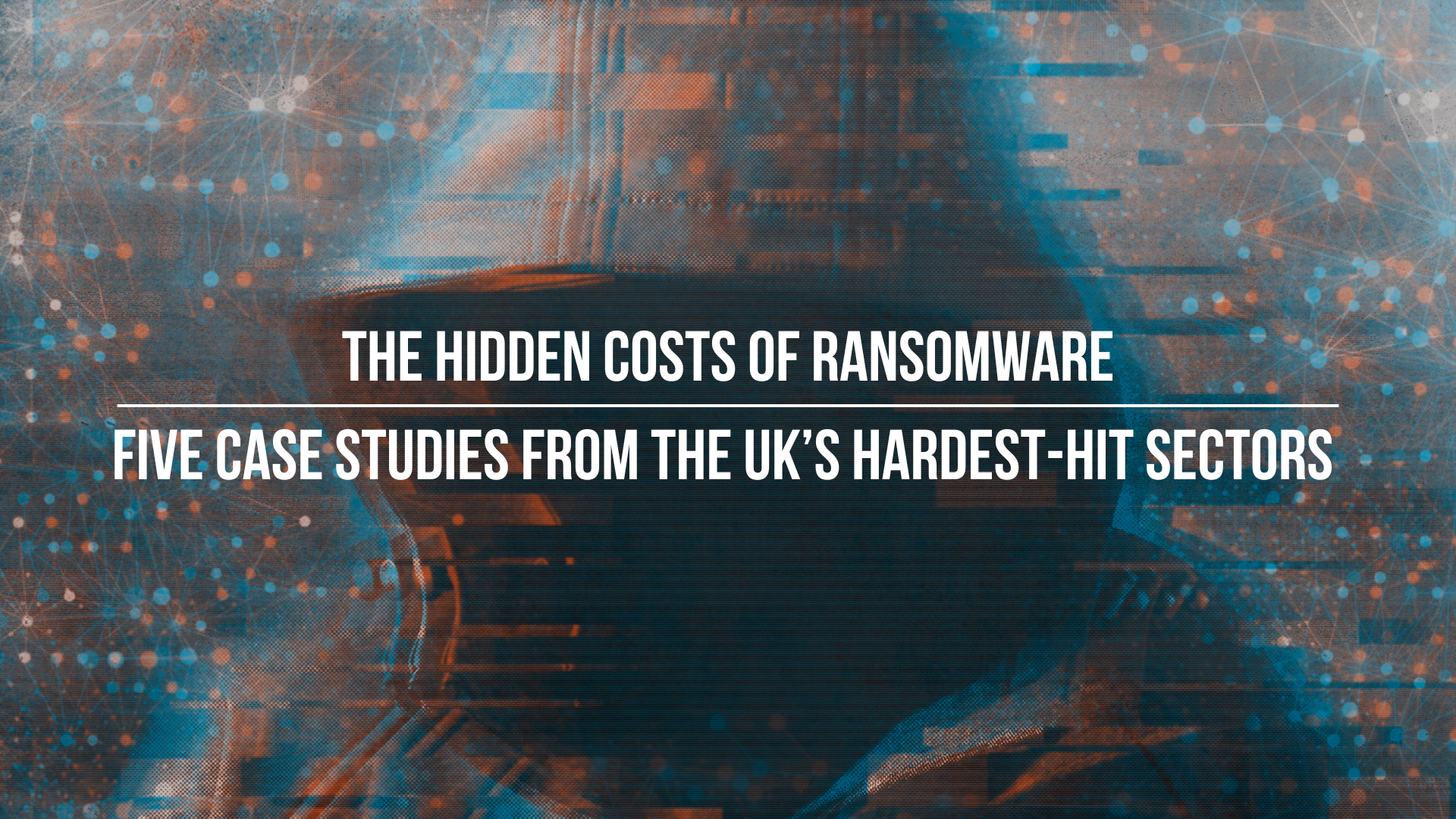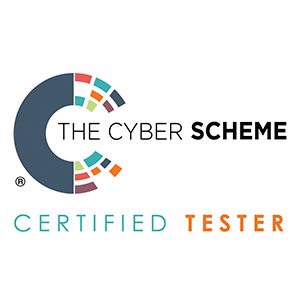
The Hidden Costs of Ransomware: Five Case Studies from the UK’s Hardest-Hit Sectors
Ransomware isn’t just a tech geek’s nightmare anymore, nor is it something that you read about solely in tech blogs – it’s affecting everyday life across the UK.
Hospitals, councils, ports, and even schools have been hit, proving that ransomware’s impact goes far beyond locking up data. It’s disrupting critical services, halting supply chains globally, and forcing people to put their lives on hold.
When a hospital’s blood testing system goes down, it directly impacts patient care. When a council’s IT fails, residents who depend on public services are left stranded and when ports are targeted, supply chain delays ripple through businesses and consumers worldwide increasing costs of everyday items.
These incidents remind us that ransomware isn’t just an IT issue—it has real-world consequences.
To better understand the real-world consequences of ransomware, let’s take a closer look at five specific incidents that have impacted various sectors across the UK. These case studies highlight the true extent of ransomware’s disruption, detailing how each attack played out and the broader consequences that followed.
Case Study 1: Healthcare Under Siege – The Synnovis Ransomware Attack (June 2024)
In June 2024, the Qilin (Agenda) ransomware group launched a cyberattack on Synnovis, a vital pathology services provider for multiple NHS hospitals, including Guy’s and St Thomas’, King’s College Hospital, and GP services across southeast London. This wasn’t just a breach—it sent shockwaves through the entire healthcare network, leaving critical systems crippled.
The Immediate Fallout: Hospitals found themselves unable to process essential blood tests or diagnostics, which severely impacted patient care. Non-urgent surgeries were cancelled or postponed, and doctors struggled to match blood donors to recipients.
In response, hospitals had to rely on O Positive and O Negative blood, the universal donor types, leading to a dangerous shortage. Emergency services managed to keep running, but the strain on resources was felt across the board.
The Ripple Effect: GP services reliant on Synnovis for routine tests also experienced delays that affected patient appointments and treatment plans.
While Synnovis initially claimed there was no evidence of a data breach the ransomware group said otherwise, sparking fears of compromised patient data. The uncertainty added to the pressure on healthcare workers already stretched thin.
Response and Recovery: A task force involving Synnovis IT experts, the National Cyber Security Centre (NCSC), and law enforcement were swiftly deployed to handle the situation. Despite their efforts, the recovery took weeks, with hospitals and clinics forced to adapt to reduced functionality in the meantime.
Case Study 2: Council in Crisis – The Leicester City Council Ransomware Attack (March 2024)
On March 7, 2024, Leicester City Council became the target of a ransomware attack orchestrated by the INC Ransom group, a criminal organisation with a track record of targeting government, healthcare, and educational institutions.
The attackers claimed they had stolen around 3 terabytes of sensitive data, including confidential documents like rent statements, social housing applications, passport scans, and personally identifiable information (PII). The council took immediate action, shutting down its IT systems, which led to critical services like phone lines and the council’s network being taken offline.
The Immediate Fallout: The attack triggered chaos across key council services including child protection, adult social care, and homelessness services. To make matters worse, the hackers leaked around 25 documents as proof of the breach, heightening concerns. Emergency contact numbers were set up to help those affected, but anxiety grew among residents—especially those whose sensitive personal data, such as passport details, were believed to be stolen.
Ripple Effect: This wasn’t merely a technical inconvenience; it severely impacted the people relying on Leicester City Council’s support. From social care to housing support, residents suddenly found themselves cut off from the help they needed.
For those whose data was compromised, it was more than an inconvenience—it sparked real fear about identity theft. Even though systems started coming back online within weeks, the unease in the community didn’t disappear overnight.
Response and Recovery: The council didn’t waste time, bringing in the NCSC and Leicestershire Police to get to the bottom of the attack. They also flagged the breach to the Information Commissioner’s Office, keeping affected residents in the loop. Although services were gradually restored, the attack was a harsh reminder of just how vulnerable both local governments and citizens can be when cybercriminals strike.
Case Study 3: Maritime Mayhem – The Ransomware Attacks on EU Ports (2022-2024)
From 2022 to 2024, the maritime sector found itself in the crosshairs of ransomware groups like PLAY, with ports like London and Antwerp taking serious hits. These attacks weren’t just random—they were politically charged, with many connected to the war in Ukraine.
The result? Major port operations were crippled, and as a result the logistics sector was thrown into chaos.
Immediate Fallout: Once the ransomware hit, it didn’t just slow things down—shipping delays piled up fast, and the knock-on effect quickly rippled through global supply chains. Cargo sat idle, shipments were delayed, and businesses reliant on international trade experienced significant setbacks.
Ripple Effect: As a result of this logistical disruption and delayed shipments, manufacturers and retailers reliant on just-in-time deliveries felt the strain as supply chain bottlenecks became more pronounced.
Prices of goods rose in some sectors because of delays, and industries already struggling with global supply chain issues saw these attacks compound their problems. The economic effects of these attacks were felt globally, as delayed goods and services put immense pressure on businesses and consumers alike.
Response and Recovery: Port authorities moved quickly to contain the damage, shutting down critical systems to prevent further infiltration. Cybersecurity experts were called in to investigate, and emergency protocols were activated to ensure the safety of operational technology (OT) systems.
The National Cyber Security Centre (NCSC) and law enforcement agencies were brought in to assist with the response and investigation.
Though recovery took time, ports managed to restore operations, but the threat of future attacks remained a constant concern.
Case Study 4: Education Interrupted – The Charles Darwin School Ransomware Attack (September 2024)
In early September 2024, Charles Darwin School, a high school in South London, was hit by a ransomware attack. Initially detected as an IT disruption, the attack quickly escalated, revealing that the school’s systems had been severely compromised.
Concerns grew that sensitive data, including staff and student information, might have been accessed by the attackers. In response, all staff devices were taken offline for security checks, and the school’s entire IT system, including Microsoft 365 accounts, was disabled to prevent further damage.
The incident mirrored recent ransomware attacks on other UK schools, such as Wymondham College and Tanbridge House School.
Immediate Fallout: With the IT systems down, the school had no choice but to close for three days, sending 1,300 student’s home. Teachers had to scramble to re-plan lessons and administrative systems had to be reorganized to ensure the school’s functionality. Meanwhile, parents were asked to be on high alert for any suspicious emails, since their kids’ accounts were temporarily disabled.
Ripple Effect: The closure disrupted not only students’ education but also caused concern among parents about the security of personal information.
If sensitive data had indeed been accessed, the potential for identity theft and fraud loomed large. As with previous school ransomware attacks, the long-term threat of data leaks left the school and parents grappling with uncertainties about how far-reaching the consequences might be.
Response and Recovery: The school commissioned a cybersecurity firm to investigate the breach. The headteacher admitted that ransomware attacks were becoming all too common for public institutions like theirs but reassured everyone that the school had taken the right precautions.
The National Cyber Security Centre (NCSC) was also involved, helping guide the recovery efforts. While the immediate crisis was managed, it left the school facing a tough road ahead in securing its systems against future threats.
Case Study 5: Manufacturing Disrupted – The Eurocell Ransomware Attack (March 2023)
In March 2023, Eurocell, one of the UK’s biggest UPVC manufacturers, got hit by a ransomware attack that encrypted a large chunk of their data, including sensitive customer info and crucial product designs. The attackers made their move, threatening to wreak even more havoc unless Eurocell coughed up a ransom.
Immediate Fallout: The attack threw a spanner in the works, hitting Eurocell’s manufacturing and distribution hard. Deliveries were delayed, especially for construction projects relying on their UPVC products. To stop the damage from spreading, Eurocell shut down parts of their network, but it slowed down day-to-day operations and caused more delays for everyone involved.
Ripple Effect: The disruption extended beyond Eurocell’s immediate operations. Projects reliant on Eurocell’s products were left in limbo as project timelines were pushed back, leading to frustrated clients and potential financial losses.
The ripple effect was felt across the supply chain, with contractors and developers unable to access necessary materials, causing a slowdown in construction timelines. Everyone, from contractors to end consumers was impacted.
Response and Recovery: Eurocell decided against paying the ransom, opting instead to restore systems from backups. Though the recovery process took several weeks, they successfully resumed operations without any further data loss.
In response to the attack, the company strengthened its cybersecurity measures, investing in advanced threat detection systems to better safeguard against future incidents.
Ransomware has clearly evolved into a formidable weapon, targeting not just data but the very systems that underpin essential services. The cases explored here show a worrying trend: many organisations are still reacting to these attacks, rather than being proactive about cybersecurity.
In Summary
The key takeaway from these case studies is the urgent need for a shift in strategy. It’s not enough to rely on basic defences or hope that attackers will bypass your systems. Organisations must invest in comprehensive security protocols that include regular pen tests, vulnerability assessments, robust backup solutions, and incident response plans that can be deployed immediately when an attack occurs.
But it’s not just about individual defences. We live in an interconnected world, where an attack on one organisation can disrupt an entire network of services. That’s why industries need to start working together, sharing intelligence, and building a collective strategy. The faster we can anticipate these threats and react, the less damage they’ll cause.
At Incursion Cyber Security, we don’t just help you recover from ransomware—we help you prevent it. Our team of experts offer tailored security solutions, from penetration tests to full-scale security audits, ensuring you’re prepared for any attack. If you’re ready to build resilience into your organisation and stay one step ahead of cybercriminals, reach out to us today!









